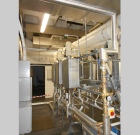Rinnai offers bespoke water heating systems

As part of its approach to providing a complete turnkey water-heating system solution, Rinnai has tested on site a bespoke solution that has now been adopted as the preferred water-heating choice for a high-profile global brand. Chris Goggin, associate director with Rinnai UK, says, ‘Legislation and standards create an over-complicated message when it comes to procurement, and this is where specifiers and designers for commercial and domestic projects need help to select the right products for the job.’
These bespoke packages are frequently used in restaurants and have been designed to provide better efficiency on site and protect against hard-water problems. The system is supplied to site in bundles, so wasteful time away from site can be limited.
The pack includes Rinnai Infinity continuous-flow gas-fired water heater and all relevant parts, including water treatment where necessary.
Chris Goggins says, ‘The water heaters far surpass the seasonal-efficiency requirements for heat generators in new and existing buildings to ensure current and future compliance.’
Rinnai supplies bespoke installation instructions and schematics, including commissioning sheets for sign off for both Rinnai and water-treatment products.
Complete building control is enhanced by Rinnai controls, including a BMS interface and legionella-control prototype.








